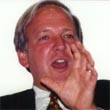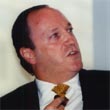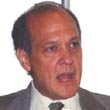Winter 2000
Reinventing Journalism:
What Is It and What Could It Be?
In late September, the Pew Center sponsored a forum in New York that engaged a distinguished panel in imagining the future of journalism. The session was anchored by keynoter Mike McCurry, President Clinton’s former Press Secretary. Here are some highlights:
 Mike McCurry, President Clinton’s former Press Secretary:
Mike McCurry, President Clinton’s former Press Secretary:
“So much of what we are sending out into the ether -whether we’re a government spokesman or it’s those of you who report the news today – just falls on deaf ears. Why? Because it just lacks those things that I think are central ingredients of effective communication.
Part of my life now is to run around doing media training… I give people my five C’s for effective communication.
- Credibility. People need to know that you are someone with a reputation for accuracy and honesty.
- Candor. You have to have the capacity to acknowledge mistakes, to correct them, to sort of handle the truth, even when it hurts.
<item<B>Clarity. You have to know what you’re trying to say and say it in ways that people will understand and hear. When we blur the distinction between information and entertainment and people are not sure how they’re being approached – are you trying to entertain us or are you trying to tell us something that matters? – it risks the very essence of the communication being put forward.
- Commitment. This is hard work. To break through this clutter, you have to tell the story over and over again … Repetition is something that counts.
- Compassion. The ability to be civil towards one’s opponent and to not always question their motive instantaneously is something that we, in politics, have lost. And I think that, in some respects, you in journalism have lost, too.
… I don’t have an antidote to what I think ails this system, but I do think it starts, first, with really thinking seriously about how we talk to each other and improving the quality of communication.
… Second, we have to understand that speed kills… In this environment, where things go faster and faster, we still have clunky old human brains that only work so quickly. And speed is the enemy of good when it comes to truthful, accurate reporting to the American people.
Third, the paralysis of analysis, the impact of putting everything in context, of trying to shape someone’s understanding of the story by going to the why before you give them the who, what, when, where.
Fourth, maybe we’ve got the wrong question for this discussion. Maybe it’s not so much journalism that we need to reinvent, but news itself … It’s certainly true that journalists have always had an attraction to waste, fraud, abuse, corruption, scandal because I think they believe that’s contrary to the norm.
But it has been so often portrayed that way to the American people they believe now it is the norm … So maybe we start with some proposition that good news is something that we need.
… I’m not bleak about the future. I do not believe that it’s lowest-common-denominator, market economics that drive people to put tabloid shows on television and to go for the more prurient and salacious when it comes to news coverage. I think it’s just because nobody has figured out what else to do.
I think the answers will come as we enter this new environment in which all of the impact of technologies of change multiply the avenues through which people encounter public life.
So that would be my prescription. First, communicate better. Second, slow down. Third, judge and opinionate less. Fourth, exalt something about the good that is in civic life. And fifth, sell hard news because there is a market for it.”
 Zoe Baird, President, The Markle Foundation:
Zoe Baird, President, The Markle Foundation:
“One of the important ways [journalism] is going to change our lives is what people think of as news and how people get their news.
… I think that what is wrong with the way things are now … is that so much of the energy, talent and resources in modern journalism today – especially, in my opinion, on television – is spent creating entertaining news about very unimportant subjects. I think the problem, journalistically, is not that you shouldn’t make entertaining news. It’s that you should make entertaining news that is engaging about important things.”
 Steve Brill, Editor-in-Chief, Brill’s Content:
Steve Brill, Editor-in-Chief, Brill’s Content:
“Mike said something I thought was very important, which is that it is not necessarily the best economic model to do the kinds of things that lots of journalism organizations are doing. It is the only thing that they know how to do, or it is the quickest, fastest solution.
…Businesspeople who have taken a long-term view and invested in doing quality work have won.
…Ultimately, when you have an oversupply of something, no matter what the industry is, consumers get pickier, get smarter and become more in control and can start to demand not only lower prices, but can demand better quality. And I think that’s what we’re on the verge of.
 Jack Nelson, Former Washington Bureau Chief, Los Angeles Times:
Jack Nelson, Former Washington Bureau Chief, Los Angeles Times:
“I was struck by what Mike said about maybe the name of this panel should have been reinventing the news rather than reinventing journalism … There is a real newsroom culture out there that looks at anything that may be a change in the way you do journalism as being something that is undermining what they have traditionally done … But I think in many cases newsrooms in this country are broke. And I think they need to be fixed. I think that anytime you have a program that’s looking at ways to change the way you cover news, to bring more people involved in covering the news, to get closer to the community, the better off journalism will be.”
 Alex Jones, Host of PBS’ “Media Matters,” Author, Journalism Educator:
Alex Jones, Host of PBS’ “Media Matters,” Author, Journalism Educator:
“I think that one of the really critical problems of American journalism is a sort of void of leadership … I think that a public corporation wants a very different kind of person to lead a newsroom.”
Baird: “If I had any advice it would be… just experiment with some new things. Use the web and use that website to develop a new relationship with the audience, drawing on the heart of what the brand means and the heart of what journalism means.
… Experiment with things but do it in a way where you don’t feel you have to give up what you value and see whether it’s possible, over time as you stake a claim to this new communication environment, see if it’s possible to really build what you think is important before other people define the rules.
… Experiment with some economic models, experiment with some models of communicating with the public, experiment with some models of engaging the audience and being part of the enterprise of journalism as well as part of the readership and see where it takes you.”
Jones: “This is what I would do. I would find someone to run my news operation … someone who is not reactively allergic to change … I would say to him or her: I want you to figure out what news is really important to the people we are trying to get at … And then, once you’ve identified important, I want you to use every bit of imagination that we command in this organization to figure out a way to cover the important well … I think that will make us the most relevant, the most useful and, in theory, the most successful that we could be.”
Brill: “A lot of news today is almost completely fungible… You no longer need to buy a newspaper to find out what the weather is going to be, to find out what happened in the stock market, to get the sports scores.
The real area where brand-name stellar news organizations can win is where they add value to that commodity. When it comes to the value-added journalist … they are more valuable than they ever were precisely because there’s so much stuff out there.
It’s almost the equivalent of me telling you that you could go down to the library at 42nd Street but the only problem is there aren’t any lights on, there aren’t any shelves, and the books in fact aren’t even bound into books. There are just 6 trillion pages flying around there. You’d pay a lot of money for a librarian to help you through that.”
McCurry: “… In truth, this new technology is going to be able to allow us to market to a single individual.
…What we need, somewhere in our public life, are those who step back and sort of examine what does the community need? What do we have as shared values that are important? I think that is quintessentially the role for journalists. That they have got some ability to kind of step back and imagine what matters and imagine something larger and better than what is the pecuniary self-interest of the person sitting there examining the product. I think there is great opportunity for that.”
